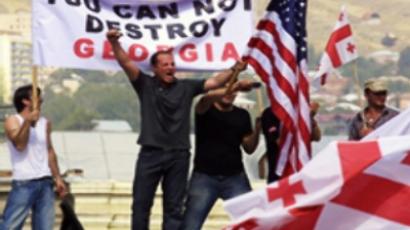Saakashvili sacks PM - for probing South Ossetia conflict?
Georgian President Mikhail Saakashvili has dismissed the country's Prime Minister, Lado Gurgenidze, in a cabinet overhaul following the military operation in South Ossetia.
“We’ve decided together with Lado Gurgenidze, that the country needs new drive, new energy. So Lado will move to the financial sector. He’ll chair the new commission in charge of controlling the financial crisis and stabilising the economic situation in Georgia,” Saakashvili said.
Georgian media reports suggest Defence Minister David Kezerashvili might also leave his post.
Saakashvili has come up with the suggestion of Grigory Mgaloblishvili for the position of Prime Minister. Mgaloblishvili has recently been working as the country’s ambassador to Turkey.
The Georgian President says moving the former Prime Minister, Gurgenidze, to the Financial Commission is part of a plan to energise the government and the decision is not a sudden one.
According to him, when Gurgenidze was made the head of government, it was agreed he would leave the post in exactly a year.
But analysts suspect this dismissal could actually be related to the August events in South Ossetia and Saakashvili’s attempt to appease the opposition who are criticising him for his actions during the conflict.
“If the reports are true that the Defence Minister is dismissed together with the Prime Minister, then there’s no doubt the move is being made in a wake of the war in South Ossetia region. The replacement of the Prime Minister could be a preemptive step by Saakashvili; he now can say to his opposition: Wait a bit, I’ve done what I could,” says political analyst Kirill Bessonov.
But the opposition has greeted the whole affair with a fair amount of scepticism.
“In Georgia the post of Prime Minister means nothing. It’s a nominal position> His duties only include meeting and greeting foreign guests. In reality the government is controlled by the Minister of Internal Affairs. So we’ll only find out whether there will be any real shake-up once it becomes clear if that post is being changed,” said Georgia’s Conservative Party leader, Kakha Kukava.
The move comes amid growing tensions between President Saakashvili and his former ally, the ex-speaker of parliament, Nino Burdzhanadze. She has announced she's forming an opposition party and is accusing the Georgian leader of preventing the formation of a democratic society.
“If there is no political will of the president to change reality, to strengthen democracy in the country, it doesn’t really matter who will be in the cabinet of ministers,” said Burdzhanadze . “The most important thing is to change the political direction in which Georgia should move, because now we are moving in the wrong direction, towards weakening the democracy, killing democratic institutions in the state”.
In November opposition supporters are planning to hit the streets in protest against the current government.
A year ago mass anti-government rallies ended in violence when police moved in to disperse the crowds and this year following the conflict with Russia and South Ossetia, organisers say there will be even more people on the streets.
Probe underway
Georgia's parliamentary commission is currently investigating the August conflict.
The head of the commission told Russia's Kommersant newspaper the group is looking at the performance of the government and military in the build-up to, and during, the conflict.
The commission was set up immediately after the August conflict. It contains five members of the opposition and five from the ruling majority.













